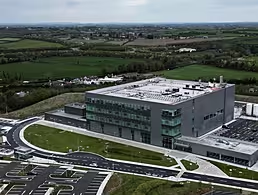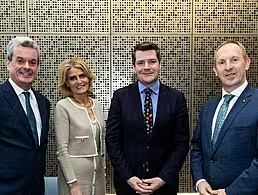A series of reforms to enhance Ireland’s standing as the internet capital of Europe will provide 2,000 additional ICT graduates in the next year through the education system and the employment permits system.
Ireland’s Minister for Jobs, Enterprise and Innovation, Richard Bruton, TD, and the Minister for Education and Skills, Ruairí Quinn, TD, are driving the reforms, which are part of the Action Plan for Jobs 2013, and strive to provide Ireland with the highest proportion of ICT graduates as a share of third-level graduates by 2018.
The ministers made the announcements today at ICT company Version 1 in Dublin, which itself is hiring 10 people who have graduated from the new ICT conversion courses.
“The first 400 graduates from the ICT conversion programmes are now available,” said Quinn. “The decision by Version 1 to recruit 10 of these graduates demonstrates the potential that exists to significantly expand the pool of talent available to the ICT sector.”
At the moment there is a global demand for high-tech skills and in order to give Ireland an edge as a location for international mobile talent, changes are being made to its employment permits system. The reforms include:
- An increase of 50pc, or 700, in the number of employment permits granted over the coming year in the ICT sector.
- A reduction of 33pc in the processing time for employment permits.
- Improvements in the appeals process and a reduction in the number of appeals.
- Broadening the highly-skilled eligible occupations list.
- Improved customer service and communications.
- Other areas where there is also a shortage of sufficient skilled talent.
Under the ICT Skills Action Plan that Bruton and Quinn published last year, an additional 1,300 ICT graduates will be supplied in 2013 by the education system, including 700 additional graduates from ICT skills conversion programmes, and 600 additional graduates from Springboard ICT courses.
“The ICT sector forms a key part of the Government’s plans for jobs and growth, and since we have come to office we have seen an increase of more than 11,000 in the number of people at work in this sector,” Bruton said.
“We in Government are determined to sustain this growth with ambitious action to make Ireland the internet capital of Europe. In order to do this we must have structures in place, through the employment permits system as well as the education system, to ensure that Irish and multinational businesses in the sector can hire the skilled workers they need in Ireland.
“International research has shown that every high-tech job created leads to an additional four to five jobs elsewhere in the economy,” Bruton added.
A further 300 graduates from the conversion programmes will be available before the end of the year, as well as 600 graduates from high level Springboard ICT programmes. The impact of these initiatives will be to double the projected output of honours degree-level ICT graduates from the education system in 2013.




